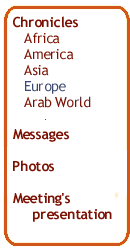|

- Chronicle
of the day
- First
Chronicle
- Chronicle June, 18th
- Chronicle
June, 19th
- Chronicle
June, 20th
|
Daybreak was sunny. The
large main room of the Sinaia Casino, in Rumania, was filled
with the expectations of 140 men and women from 40 European
countries. Dacian Ciolos welcomed them. Manola Rauss
placed the meeting in the framework of the Alliance World
Assembly.
Sandro Guiglia and Elise
Massicard, facilitators of the group "Democratic
governance for Europe" proposed that the civil
society should design a European project for the future,
utopian and realistic, at the service of citizens. How
can a European public opinion be developed, with social
organisations of continental dimension? How can institutions
be reformed on the basis of the principle of active subsidiarity?
How will a political European Union contribute to an innovative
world governance? How will we define the role of European
politics facing the globalisation of the economy? How can
a debate be organised on a new European constitution based
on a participatory process?
Homo economicus and homo ludens
==========================
The group "Work
and social organisation", facilitated by Hans Harms
and Hugues Puel, highlighted that we've been moving from
"homo ecomomicus" to "homo ludens".
Our responsibility is to find concrete solutions to the
crisis of trust in politics. How can we organise our
societies where having a permanent job as source of income,
is also in crisis? How can we increase civic involvement
in common matters? How a European citizenship be organised,
which will go beyond negotiations among government interests?
This meeting, with people from different European cultures,
will be a key experience to learn how to create a common
future.
Philippe Cacciabue and
Iain Farquhar from the group "Rural world and sustainability"
highlighted that Europe with an unsustainable agriculture
was built to respond to the fear of war and hunger.
How can we elaborate new sustainable production systems?
How can we use technology that favours nature when the agrifood
industry is resisting change? How can we recover citizens'
trust in the food system that supports quantity? What could
a new contract between agriculture and society be like?
How can we orient the enlargement of the European Union?
We are excited that in our group, there are 37 persons and
27 nationalities to share concerns and proposals!
Living together for better living
======================
The "Migrations
and intercultural citizenship" group, facilitated
by Karine Boyer and Paul Oriol, believes that facing
demographic decrease and labour scarcity, a "fortress
Europe" is inadequate. The European Community cannot
consider its future without taking the rest of the world
into account. How can codevelopment contribute to the
expansion of the weakest economies? How can we invent another
form of development, which is not as unsustainable as the
Western form? What alternative policies on borders are there?
How can we improve integration processes so they facilitate
living together for better living?
The session ended with
three participants' reflections: For the first time in a
European meeting of the Alliance, 60 % of the participants
are not from the EU! Keeping in mind that the majority
of decisions is taken by politicians... how can they be
influenced by the civil society? Shouldn't we start speaking
of the "Peoples' Europe"?
More tomorrow!
>From Sinai, in Rumania,
on June 17, 2001, European Continental Meeting
Marti OLIVELLA
|


